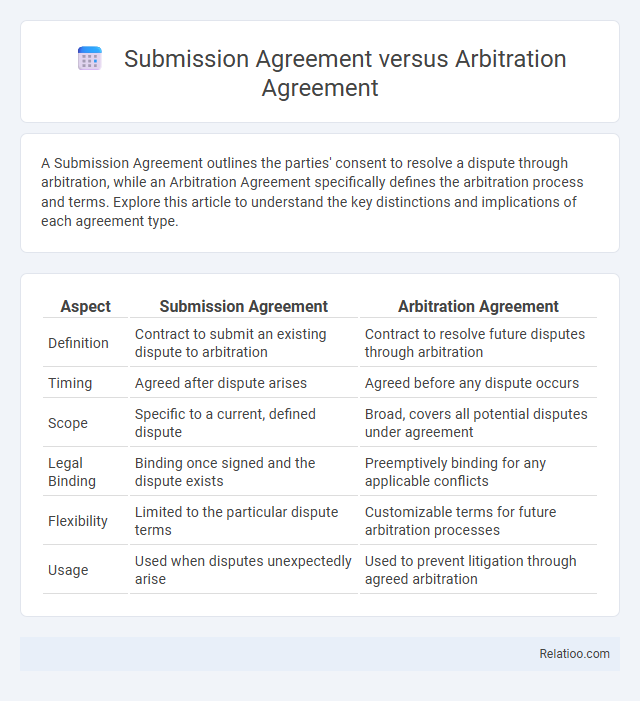A Submission Agreement outlines the parties' consent to resolve a dispute through arbitration, while an Arbitration Agreement specifically defines the arbitration process and terms. Explore this article to understand the key distinctions and implications of each agreement type.
Table of Comparison
| Aspect | Submission Agreement | Arbitration Agreement |
|---|---|---|
| Definition | Contract to submit an existing dispute to arbitration | Contract to resolve future disputes through arbitration |
| Timing | Agreed after dispute arises | Agreed before any dispute occurs |
| Scope | Specific to a current, defined dispute | Broad, covers all potential disputes under agreement |
| Legal Binding | Binding once signed and the dispute exists | Preemptively binding for any applicable conflicts |
| Flexibility | Limited to the particular dispute terms | Customizable terms for future arbitration processes |
| Usage | Used when disputes unexpectedly arise | Used to prevent litigation through agreed arbitration |
Introduction to Submission and Arbitration Agreements
Submission agreements are contracts where parties agree to submit a specific dispute to arbitration rather than litigation, defining the scope and terms of arbitration. Arbitration agreements establish a pre-dispute commitment allowing disputes to be resolved through arbitration, specifying rules, arbitrators, and procedures. Understanding Your choice between submission and arbitration agreements affects dispute resolution strategies and enforcement mechanisms.
Definition of Submission Agreement
A Submission Agreement is a contract in which parties agree to refer a specific dispute to arbitration, defining the scope and terms of the arbitration process. Unlike a general Arbitration Agreement that sets arbitration as a method for resolving future disputes, a Submission Agreement applies to an existing conflict already arisen between parties. Submission involves voluntarily submitting a dispute to a chosen arbitrator or tribunal for binding resolution, with the Submission Agreement clearly outlining this procedure.
Definition of Arbitration Agreement
An Arbitration Agreement is a contract where parties agree to resolve disputes outside of court through arbitration, defining the arbitration process and the scope of matters subject to arbitration. Submission Agreement differs as it is a specific consent to submit an existing dispute to arbitration after the conflict has arisen. Understanding these distinctions helps you effectively manage dispute resolution clauses in contracts for streamlined legal processes.
Key Differences Between Submission and Arbitration Agreements
Submission agreements specifically outline parties' consent to arbitration for a particular dispute, while arbitration agreements establish a general, ongoing obligation to arbitrate future disputes. Submission agreements are typically ad hoc, created after a dispute arises, defining the scope and procedures for that specific case. Arbitration agreements are proactive contracts embedded within broader agreements, ensuring disputes are resolved through arbitration rather than litigation.
Legal Basis and Enforceability
A Submission Agreement establishes the parties' consent to refer a dispute to arbitration under a specific legal framework, ensuring enforceability through contract law principles and relevant arbitration statutes like the Federal Arbitration Act or the New York Convention. An Arbitration Agreement is a broader clause or contract mechanism mandating arbitration to resolve disputes, grounded in recognized legal standards that courts typically uphold to avoid litigation. Submission refers specifically to the act of submitting a dispute to arbitration, often formalized post-dispute, with enforceability relying on the parties' express consent and applicable arbitration laws.
Scope and Applicability
A Submission Agreement specifically refers to parties' consent to submit a dispute to arbitration, defining which issues are subject to arbitration. An Arbitration Agreement is broader, encompassing any contract clause where parties agree in advance to arbitrate future disputes arising from their relationship. Submission without an explicit arbitration agreement may be limited to particular cases or existing disputes, whereas Arbitration Agreements usually provide a comprehensive scope covering all related disagreements.
Drafting Considerations
Drafting considerations for Submission Agreements, Arbitration Agreements, and Submissions require clear definitions of scope, dispute types, and procedural rules to avoid ambiguity and enforcement issues. Your agreement should specify the choice of arbitrators, governing law, and venue to ensure efficient dispute resolution tailored to the parties' needs. Careful attention to these elements enhances clarity and minimizes potential conflicts during arbitration proceedings.
Advantages and Disadvantages of Each Agreement
A Submission Agreement offers the advantage of flexible dispute resolution by allowing parties to specify how and where disputes will be resolved, but it may lead to uncertainty if terms are not clearly defined. Arbitration Agreements provide a binding and enforceable process that often results in faster and more confidential resolutions compared to court litigation, though arbitration can be costly and limits appeal options. Submission, in the context of dispute resolution, allows parties to consent to resolve a specific dispute outside court, providing control over the process but sometimes lacks the formal structure and enforceability of arbitration agreements.
Common Use Cases and Examples
Submission agreements are commonly used to refer disputes to arbitration after a conflict arises, allowing parties to agree on arbitration terms mid-dispute. Arbitration agreements typically form part of contracts, setting out mandatory rules for resolving future disputes through arbitration rather than court litigation. Understanding your use case helps determine whether a prior arbitration clause or a post-dispute submission agreement best suits your legal strategy.
Conclusion: Choosing the Right Agreement for Dispute Resolution
Selecting the appropriate dispute resolution mechanism hinges on the nature and complexity of the conflict, with a Submission Agreement offering flexibility by outlining specific terms for arbitration tailored to the parties involved. Arbitration Agreements generally provide a predefined framework, ensuring enforceability and predictability, which suits commercial contracts requiring swift resolution. Opting for a Submission allows parties to mutually decide on dispute resolution post-conflict, while Arbitration Agreements bind parties in advance, making the choice critical for aligning legal strategy with business objectives and risk management.

Infographic: Submission Agreement vs Arbitration Agreement
 relatioo.com
relatioo.com